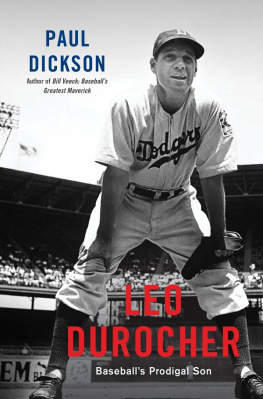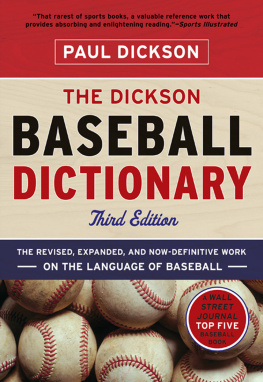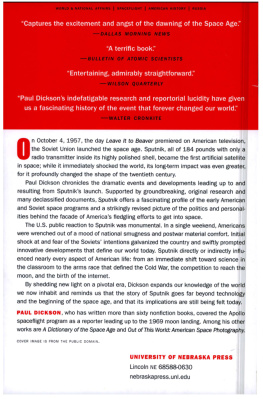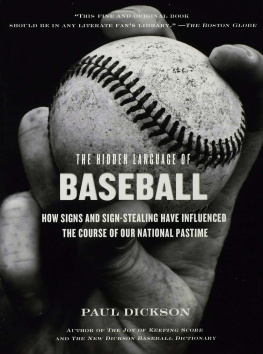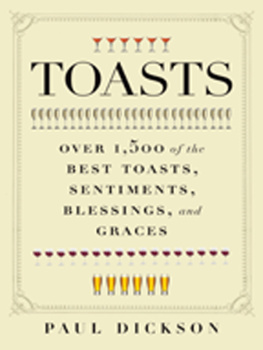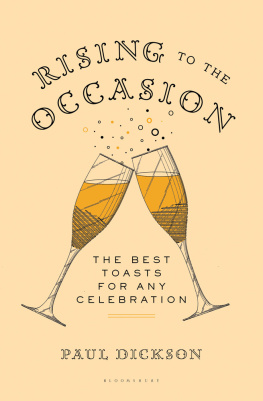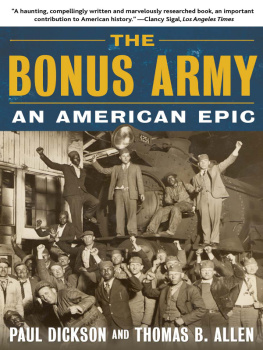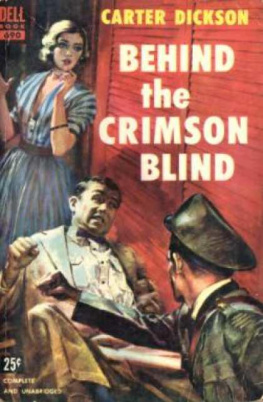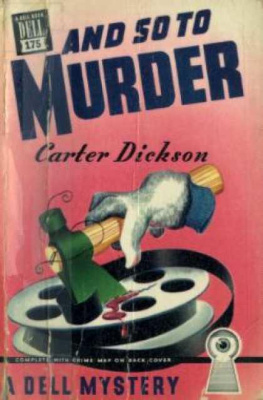Dickson Paul - Leo Durocher : baseballs prodigal son
Here you can read online Dickson Paul - Leo Durocher : baseballs prodigal son full text of the book (entire story) in english for free. Download pdf and epub, get meaning, cover and reviews about this ebook. City: United States, year: 2017, publisher: Bloomsbury Publishing/Bloomsbury USA, genre: Detective and thriller. Description of the work, (preface) as well as reviews are available. Best literature library LitArk.com created for fans of good reading and offers a wide selection of genres:
Romance novel
Science fiction
Adventure
Detective
Science
History
Home and family
Prose
Art
Politics
Computer
Non-fiction
Religion
Business
Children
Humor
Choose a favorite category and find really read worthwhile books. Enjoy immersion in the world of imagination, feel the emotions of the characters or learn something new for yourself, make an fascinating discovery.
- Book:Leo Durocher : baseballs prodigal son
- Author:
- Publisher:Bloomsbury Publishing/Bloomsbury USA
- Genre:
- Year:2017
- City:United States
- Rating:4 / 5
- Favourites:Add to favourites
- Your mark:
- 80
- 1
- 2
- 3
- 4
- 5
Leo Durocher : baseballs prodigal son: summary, description and annotation
We offer to read an annotation, description, summary or preface (depends on what the author of the book "Leo Durocher : baseballs prodigal son" wrote himself). If you haven't found the necessary information about the book — write in the comments, we will try to find it.
Leo Durocher : baseballs prodigal son — read online for free the complete book (whole text) full work
Below is the text of the book, divided by pages. System saving the place of the last page read, allows you to conveniently read the book "Leo Durocher : baseballs prodigal son" online for free, without having to search again every time where you left off. Put a bookmark, and you can go to the page where you finished reading at any time.
Font size:
Interval:
Bookmark:
To our grandchildren, Pearl, Everett, and James
POST-MILLENNIAL BOOKS BY PAUL DICKSON
Sputnik: The Shock of the Century (2001)
The Hidden Language of Baseball: How Signs and Sign-Stealing Have Influenced the Course of Our National Pastime (2003)
The Bonus Army: An American Epic (with Thomas B. Allen) (2005)
Labels for Locals: What to Call People from Abilene to Zimbabwe (2007)
Slang: The Topical Dictionary of Americanisms (2007)
The Joy of Keeping Score:How Scoring the Game Has Influenced and Enhanced the History of Baseball (2007)
Family Words: A Dictionary of the Secret Language of Families (2007)
The Dickson Baseball Dictionary, Third Edition (2009)
The Unwritten Rules of Baseball:The Etiquette, Conventional Wisdom, and Axiomatic Codes of Our National Pastime (2009)
A Dictionary of the Space Age (2009)
Drunk: The Definitive Drinkers Dictionary (2009)
Toasts:Over 1,500 of the Best Toasts, Sentiments, Blessings, and Graces (2009)
Baseball Is Defining the National Pastime (2011)
Bill Veeck: Baseballs Greatest Maverick (2012)
Courage in the Moment: The Civil Rights Struggle, 19611964 (Photographs by Jim Wallace) (2012)
Golf Is Defining the Great Game (2012)
Journalese: A Dictionary for Deciphering the News (with Robert Skole) (2012)
Words from the White House: Words and Phrases Coined or Popularized by Americas Presidents (2013)
The Official Rules: 5,427 Laws, Principles, and Axioms to Help You Cope with Crises, Deadlines, Bad Luck, Rude Behavior, Red Tape, and Attacks by Inanimate Objects (2013)
Authorisms: Words Wrought by Writers (2014)
Contraband Cocktails: How America Drank When It WasntSupposed To (2015)

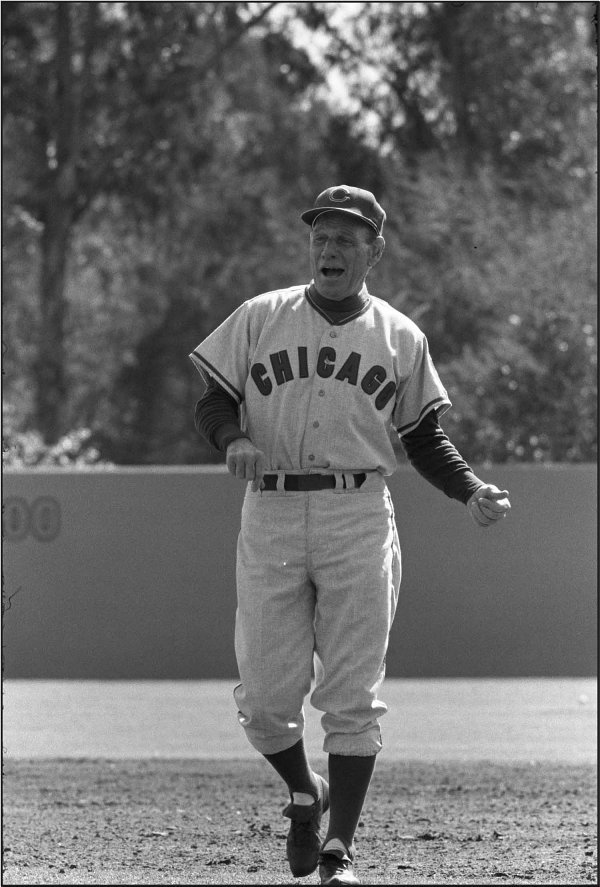
A restless Leo prowls and growls. Photo credit: Library of Congress, Look Magazine Photograph Collection, James Hansen photographer, 1966
Fate is a rat.
LEO DUROCHER, MILWAUKEE SENTINEL, JUNE 20, 1972
Enormous charm, but back him into a corner and he is still that kid in a pool room in Springfield, wearing a leather jacket, with a sawed-off cue in his hands.
BRANCH RICKEY
Leo Durocher is more of an American institution than Colonel Sanders. Before this country ever heard of Kennedy, Nixon, Gable, Disney, Earhart, DiMaggio, Presley, Flash Gordon or Dr. Spock, people knew about Leo Durocher.
EDWIN SHRAKE, SPORTS ILLUSTRATED, AUGUST 13, 1973
After a time you will gradually forget all about the other world of Republicans and Democrats, Communists and Capitalists, Hemingway, the D. and D. of Windsor and Leo Durocher.
GORE VIDAL, DEATH IN THE FIFTH POSITION, COMMENTING ON WHAT IT IS LIKE TO ENTER THE ISOLATED WORLD OF A BALLET DANCER
Leo Durocher (19051991) was baseballs all-time leading charactercocky, flamboyant, and galvanizing, casting a shadow across several baseball eras, from the time of Babe Ruth to the space-age Astrodome, from Prohibition through the Vietnam War. For more than forty years, he was a dominant figure in the game, with a Zelig-like ability to be present as a player or manager for some of the greatest teams and defining baseball moments of the twentieth century.
Unlike the passive Leonard Zelig, however, Durocher was an actor in all of it. He performed on three main stages: New York, Chicago, and Hollywood. He entered from the wings, strode to where the lights were brightest, and then took a poke at anyone who tried to upstage him. He shared the limelight on occasion, but only with Hollywood stars such as Spencer Tracy, whom he called his lucky coin; movie tough guy and sometime roommate George Raft; best friend Frank Sinatra; and his third wife, movie star Laraine Day.
He had the right script. Durocher played shortstop for four major league teams, including two that were given nicknames that still resonate todaythe 1928 Murderers Row New York Yankees and the 1934 Gashouse Gang St. Louis Cardinals. Both of these great teams won the World Series with Durocher playing shortstop. He also appeared as a player on three National League All-Star teams: in 1936 (as a Cardinal) and in 1938 and 1940 (as a Brooklyn Dodger). Although he had a lackluster lifetime batting average of .247teammate Babe Ruth nicknamed him the All-American Out because of his anemic offensehe earned a reputation as the best defensive shortstop of the era before World War II.
Durocher went on to become manager of four major league teams for a total of twenty-four seasons. He managed 2,008 wins in 3,739 games, winning three National League pennants (in 1941, 1951, and 1954) and the World Series in 1954. He was named Manager of the Year three times by The Sporting News. His lifetime winning percentage with the Dodgers, Giants, Cubs, and Astros was .540. At the time of his death, only five managers in major league history had won more games than Durochers 2,008.
Two of the teams he managedthe New York Giants and the Chicago Cubsplayed in pennant races considered to be two of the most exciting of the twentieth century. One was in 1951, when Durochers Giants overcame a 13 game deficit, going 377 down the stretch to catch the runaway Brooklyn Dodgers and beat them in a playoff series that ended with Bobby Thomsons epic home run, the Shot Heard Round the World. That final game, called the Miracle of Coogans Bluff, is still regarded as among the greatest single games in baseball history. The other pennant race involved Durochers 1969 Cubs, who had a nine-game lead in August, only to lose to the underdog New York Mets, who came out of the pack to win the pennant and ultimately the World Series.
These two pennant drives are the only two in baseball history routinely described with the word miracle, and controversy followed Durocher after each of them. Did his elaborate system of sign stealing and cheating contribute to the come-from-behind wins and Thomsons home run? Did the 1969 Cubs lose in part because Leo so demoralized his players, treating them unevenly down the stretch, deserting them during two key moments, creating turmoil in the clubhouse, and callously degrading them in defeat? Our offense went down the toilet, the defense went down the drain, and Im still looking for a pitching staff, he said of his 1969 team after they lost the pennant. I could have dressed nine broads as ballplayers and they would have beaten the Cubs.
Durocher had a profound impact on managing, with disciples who are now among the handful of managers in the National Baseball Hall of Fame. When I was a coach, my number was 52, Tommy Lasorda said at the time of Durochers death. When I became manager, I wanted to carry Leos number because of my respect and my admiration for him. He was an outstanding manager. In wearing his number, I hoped some of him would wear off on me. He was brilliant, by far one of the greats. He was a gambling, aggressive manager. He didnt worry about people second-guessing him. He had an electrifying personality with an ability to motivate men.
Durocher was also one of the most hated
Ty Cobb hated Leo because he constantly baited him with insults. Leo also played the bully to Babe Ruth, whom he called Dummy when they were Yankee teammates. Ruth accused Durocher of stealing his wristwatch. Years later, when Ruths playing days were over, he was hired by the Brooklyn Dodgers as a first-base coach. Durocher went out of his way to humiliate Ruth. The relationship ended in a fistfight that began when Durocher slapped Ruth in the face because of confusion over a signal. Manager Burleigh Grimes had to pull them apart.
Font size:
Interval:
Bookmark:
Similar books «Leo Durocher : baseballs prodigal son»
Look at similar books to Leo Durocher : baseballs prodigal son. We have selected literature similar in name and meaning in the hope of providing readers with more options to find new, interesting, not yet read works.
Discussion, reviews of the book Leo Durocher : baseballs prodigal son and just readers' own opinions. Leave your comments, write what you think about the work, its meaning or the main characters. Specify what exactly you liked and what you didn't like, and why you think so.

